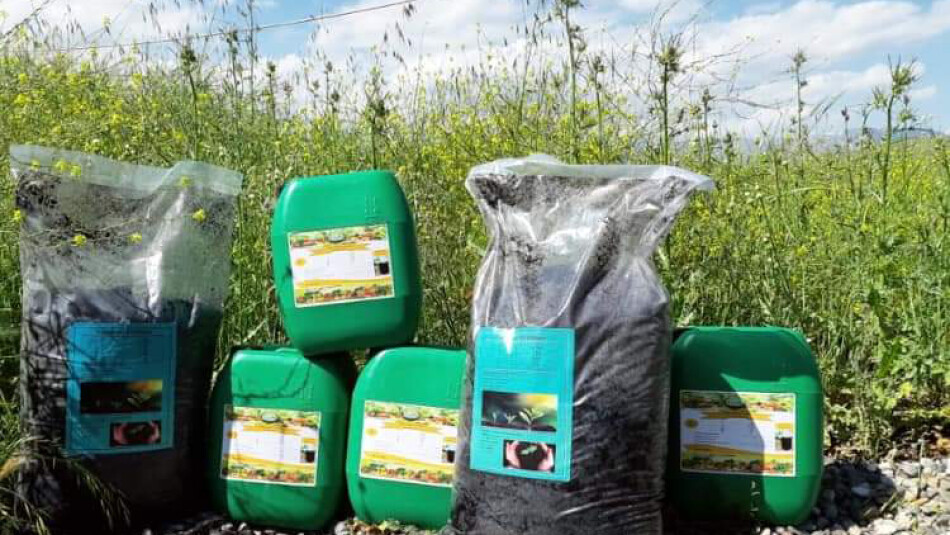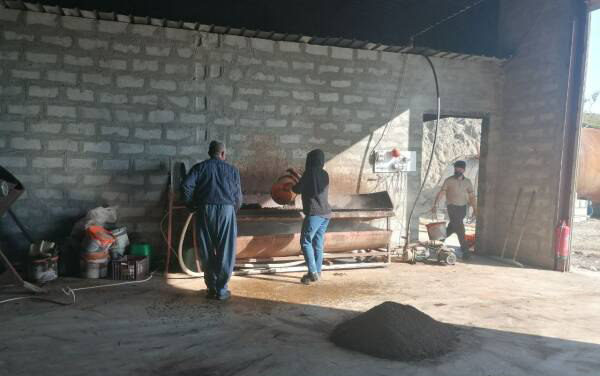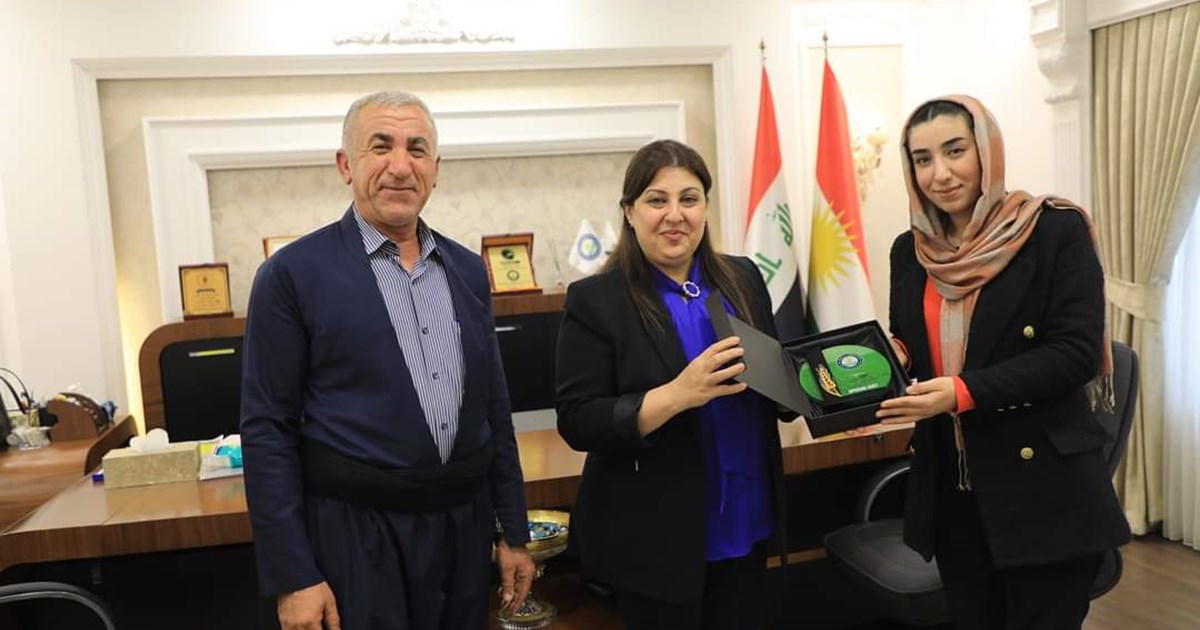
She invested everything she learned in her academic studies and university laboratories to be creative in her profession. Hazha Hassan established a small factory to provide a great service to agriculture and the environment by producing two types of organic fertilizers from poultry waste.
This young lady began offering her factory's products in the markets a few years ago, specifically in the agricultural areas of Sulaymaniyah Governorate. One of the products is a liquid fertilizer called (Biochar), and the other is a dry fertilizer called (Vermicast).
The main source of fertilizers is poultry waste, which goes through different stages until it becomes environmentally friendly agricultural fertilizers.
"We do not use any chemicals or preservatives in the production of fertilizers, so they do not cause any harm to the soil, the environment, or agricultural crops," Hassan confirms.
Natural fertilizer is an effective alternative to chemical fertilizers, and the United Nations encourages their use since chemical fertilizers cause damage to the components of the soil and the living organisms in it, and they are also a source of environmental pollution, especially for water sources.
Fertilizers as a protection for the soil
The idea of Hassan's initiative was the title of the master's thesis she submitted on organic fertilizers in 2022, thanks to which she obtained a master's degree from a university of Turkey.
However, establishing the laboratory and producing fertilizer preceded her completion of the master's thesis, when she began in 2021 to transform the project idea into practical steps with the help of her father.
We do not use any chemicals or preservatives in the production of fertilizers
After cleaning the waste from materials harmful to the environment, soil, and crops, it goes through several other stages, some of which use special devices.
Hasan, from the town Qala Diza, affiliated with the independent administration of Raparin (northwest of Sulaymaniyah), graduated from the College of Agriculture at the University of Sulaymaniyah four years before the establishment of the laboratory, so her main dealings were with the field of agriculture and she understands well what environmental disasters are.
Hasan says that the goal of the scientific research she conducted as part of her master's thesis was to find a solution to a prominent problem in society and then reach results.
The process of collecting poultry waste consists of several different stages, and Hasan explained that at the beginning and during the summer she buys poultry waste from the people who collect it, then it is placed in a store until it dries, before it is ground and finally transferred to the laboratory stores to be used as a raw material for producing fertilizers.
Poultry and livestock waste should not be used as fertilizers directly before it goes through the processing stages. According to the environmental warnings that Hassan stressed, the direct use of these wastes causes damage to the components of the soil and agricultural crops and leads to the spread of various diseases and pests.
Sawin Saleh, director of the environment of Raparin, says that if poultry and livestock waste is used directly, it will not decompose quickly in the soil, and thus the plants will not benefit from it, and the seeds of some harmful plants may mix with this waste. However, these risks disappear if the waste is treated in a scientific way, such as that followed in the Hasan laboratory.
In the laboratory, some of the substances found in poultry droppings (chicken manure), such as antibiotics, pain reliefs and vaccines, are disposed of, especially the removal of nitrogen in the form of ammonia or ammonium compounds, which directly leads to the burning of agricultural crops.
Hasan explained that after cleaning the waste from substances harmful to the environment, soil, and agricultural crops, it goes through several other stages, some of which use special devices.
"After converting the waste into fertilizer, the nutritional components retain their properties and can be used for the growth of agricultural crops."
Another initiative implemented within Hassan’s project is that she did not buy or import any of the equipment for producing natural or organic fertilizer, but rather all of them were made by her father.
By establishing this factory, Hasan provided job opportunities for her father and three of her brothers.
The factory obtained an official license in 2023. Sometimes the factory’s daily production of liquid fertilizer approaches 4,000 liters placed in 20-liter jerry cans bearing the project’s logo and information about the fertilizer’s components. As for the factory’s production of dry fertilizer, it reaches ten tons annually.
The director of the Raparin Environment, despite not being informed of the details of the factory because it was not licensed by the Environment Department, praised their efforts because she considers organic fertilizer “environmentally friendly,” and pledged to provide support and facilities for any environmentally friendly project.

Saleh strongly opposes the use of chemical fertilizers that negatively affect the environment, "Some of them spread in the air and pollute it, in addition to the fact that chemical fertilizers have bad effects on the soil."
Instructions from the Food and Agriculture Organization of the United Nations (FAO) urge farmers to use organic fertilizers because they strengthen the soil and enrich it with phosphorus and other nutrients.
Healthy Environment and Better Production
Hassan's organic fertilizer production plant leaves no waste, meaning that production waste is zero.
"The techniques and methods we use are different and the waste percentage is zero because we produce the second type out of the waste of the first type fertilizer."
The plant initially produces liquid fertilizer from ground waste. The waste that remains from the production of liquid fertilizer is not thrown away, but rather used for production of dry fertilizer and packed in special bags bearing the project logo and the components of the fertilizer in Kurdish and English.
"The scientific method of producing these fertilizers does not require chemicals and does not use preservatives after production, so it is not harmful to the soil and the environment," says Hasan.
Organic fertilizer plays a role in the growth of vegetable and fruit crops. It is healthy, protecting it from pests because it provides the soil and crops with the nutrients they need, and it also improves the quality of the soil and its ability to withstand drought and compensate for the small and large nutrients that play a role in making soil particles and storing water. All of this is part of the information that the laboratory includes with its organic fertilizer products.
We have benefited from it a lot, especially for flowers because it improves their growth
Mohamed Ali, a user of Biochar organic fertilizer, said, "We use Biochar for flowers, plants, and house trees. We have benefited from it a lot, especially for flowers because it improves their growth."
What makes him even happier is that the fertilizer is environmentally friendly and there are no concerns about using it like chemical fertilizer.
In the event of using organic fertilizer, agricultural crops do not need any other fertilizer. Organic fertilizer can be used for all types of crops in nurseries, agricultural fields, and orchards.
"Biochar" organic fertilizer is produced from collecting poultry and livestock manure, which preserves the environment and reuses it in the agricultural field, in addition to providing job opportunities for agricultural graduates," according to agricultural engineer Rebin Raza.
Raza, who also uses organic fertilizer, says that it is very useful and easy to obtain because it is available locally and represents an introduction to relying on organic fertilizer instead of chemical fertilizer in the event that the project is expanded and imports from abroad are stopped.
He says that using this type of fertilizer makes flowers and agricultural crops grow naturally and does not harm the health of the consumer, "unlike chemical fertilizers."
The Environmental Protection and Improvement Authority in the Kurdistan Regional Government KRG encourages farmers and citizens through its posts on social media to use organic fertilizers instead of chemical fertilizers to combat soil pollution, and warns that chemical fertilizers pose a major threat to the environment and all living organisms, and are also one of the causes of pollution of groundwater and surface water sources.
Saleh says that the project provides fertilizers to farmers at low prices, "and these products are safe for humans and the environment. The components of the soil, and its other benefits include moistening and aerating the soil, both of which are necessary to preserve it.”
I oppose the use of chemical fertilizers... All chemicals negatively affect human genetics
The director of the environment of Raparin pointed out that good soil activates beneficial bacteria, worms, and the decomposition process, and also allows plants to benefit more from the raw materials that are beneficial to them.
"I oppose the use of chemical fertilizers... All chemicals negatively affect the genetic genes of humans, as they accumulate in the human body, and if they do not affect the person immediately, they may leave their impact on future generations."
She hopes that farmers will rely on organic fertilizers because they remain in the soil and their effects are positive, while they do not have complete information about imported fertilizers.
Agriculture sector: difficult task for women
"The agricultural sector is one of the most difficult sectors of work for women because the sellers, customers, and consumers are men," Hasan said while talking about the challenges. She stressed the importance of women seeking to establish independent businesses.
At first, her father helped her sell and transport the factory's products before she decided to look for customers through social media, where she put her phone number and gradually began receiving calls from customers.
The agricultural sector is one of the most difficult sectors of work for women
"I tried to send out my message across and increase sales by introducing myself as an agricultural engineer. I am now very happy with my work."
Hasan sells some of her products through agricultural office agents in cities and districts or delivers them to companies, and sometimes customers directly buy her products in large numbers.

Hasan publishes images of her products on social media, accompanied by accurate information about their ingredients, how to use them, and their benefits. For example, she wrote in one of her posts that Biochar fertilizer should not be mixed with any white chemical fertilizer, and that it is suitable for all irrigation methods. She also explained all the methods of use and the amount used accurately.
The director of the environment in Raparin says that another challenge is the disposal of poultry waste or its random use, which affects the environment and angers citizens because it smells bad and is not prepared in scientific ways.
Saleh said that they lack specialized laboratories for recycling plastic and food waste, especially plastic, which leads to pollution, while it could have gone through processing stages and been used to produce organic fertilizers or energy.
There are many who study in agricultural departments like Hassan but few of them invest what they learn in the labor market, "due to the large number of graduates from agricultural departments, it was supposed that most of those working in the agricultural sector labor market would be women, but the opposite is happening."
She is happy with her work and believes that she can prove herself through her initiative.
This story has been produced as part of the program to expand the role of women in covering environmental topics. The program is implemented by the (Kirkuk Now) Media Outlet with the support and funding of the Federal Ministry of Foreign Affairs of the Federal Republic of Germany.